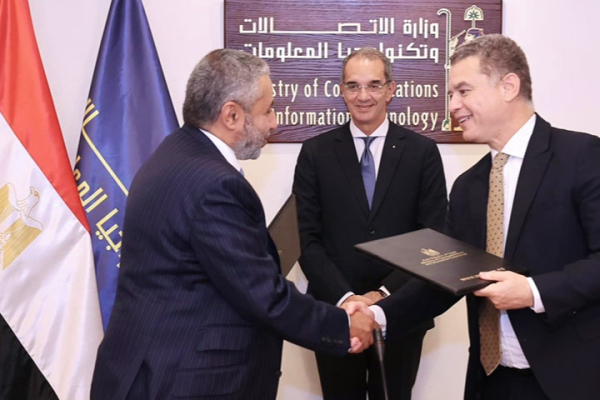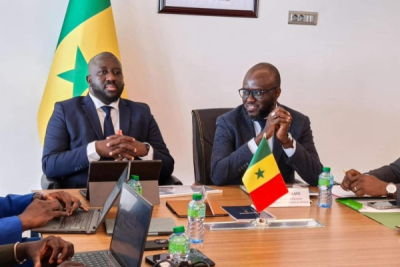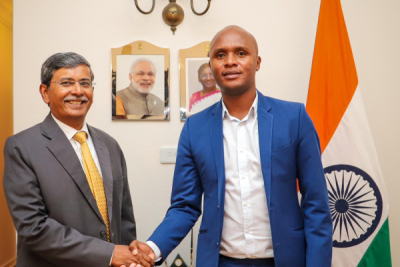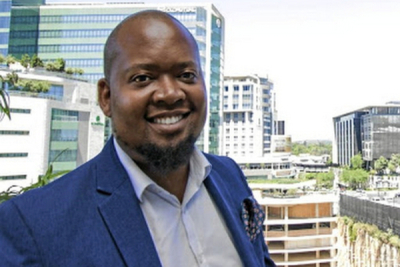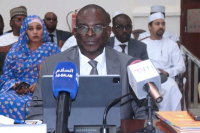Since the beginning of the year, investment vehicles have been forming across the continent to fund the startup ecosystem. Several companies have joined forces to launch a new initiative in this direction.
Mara Group, a conglomerate founded by British entrepreneur Ashish Thakkar, has announced the creation of a $250 million investment vehicle to support African startups. The agreement was signed on the sidelines of the 2024 Future Investment Initiative, held last week in Riyadh, Saudi Arabia.
Mara Group has partnered with Startupbootcamp, a technology accelerator, and India-based investment firm Blend Financial Services to execute this project. The new fund will target growth-stage startups and pre-IPO financing, with a focus on South Africa, Nigeria, Kenya, Côte d'Ivoire, and Egypt.
Besides Côte d'Ivoire, the other four target countries represent Africa’s most attractive startup ecosystems in terms of funding. According to Partech Africa data, startups in the "Big Four"—South Africa, Nigeria, Kenya, and Egypt—drew nearly 79% of the continent’s total venture capital funding in 2023, amounting to $1.79 billion. In 2022, these countries captured 72% of funding, totaling $3.5 billion. Startups in Côte d'Ivoire raised $33 million in 2022 and $21 million in 2023, making it the only Francophone country included in the initiative.
This move comes amid a tightening of capital in Africa’s tech ecosystem since 2023, a year marked by a sharp decline in startup fundraising. According to Africa: The Big Deal, African startups have raised $1.7 billion so far this year, a 32% drop from the same period in 2023.
Adoni Conrad Quenum
Egypt’s startup ecosystem is set for growth, driven by rising investor interest, government-led digital transformation, and a growing talent pool. By tackling funding and regulatory challenges, Egypt is on course to become a major tech hub in Africa and the MENA region, boosting economic diversification and digital innovation.
The Minister of Communications and Information Technology, Amr Talaat, attended the launch of "Invest IT," an innovative program to enhance investment readiness for tech startups. The program was organized on November 4, in a collaborative effort between the Technology Innovation and Entrepreneurship Center (TIEC), part of the Information Technology Industry Development Agency (ITIDA), and Flat6Labs, a leading venture capital firm in the MENA region.
Minister Talaat reaffirmed the government’s dedication to creating a conducive environment for startups and entrepreneurs. He outlined several ongoing initiatives focused on skill development, attracting international incubators, facilitating investor access, and establishing Creativa Innovation Hubs across Egypt to nurture innovative talent.
In addition, Talaat emphasized efforts to streamline startup registration processes, enhance post-establishment support, and invest in digital infrastructure to enable startups to thrive.
Ahmed Elzaher, CEO of ITIDA, expressed excitement over partnering with Flat6Labs, highlighting the agency's commitment to supporting startups from ideation to scaling internationally.
Egypt's startup ecosystem is a top performer in the MENA region, ranking third in attracting venture funding. In 2023, Egyptian startups secured $503 million in funding, a decline from the $810 million raised in 2022, according to Lucidity Insights.
The drop in funding for Egypt's startup ecosystem in 2023 highlights potential challenges in sustaining investment momentum amid shifting economic conditions. While Egypt remains a leading startup hub in the MENA region, the decline may indicate heightened caution from investors due to global economic uncertainties, regional competition, or evolving funding priorities. This shift emphasizes the need for robust support mechanisms, like government-backed programs and strategic partnerships, to help startups weather funding fluctuations.
Invest IT is designed to support ICT-enabled startups at the seed and pre-series A stages across Egypt’s governorates. The program aims to equip startups with the skills and resources needed to secure investment deals, providing a structured path to help them navigate the complexities of funding and growth.
The program will run over six to eight weeks, supporting 12 startups as they develop investment strategies and refine their pitches to investors. Upon completion, participants will have opportunities to connect with potential investors, with ongoing support from the program team.
With this support, Invest IT is poised to accelerate the growth of Egyptian tech startups by fostering a robust ecosystem that prepares them for sustainable growth and successful investment outcomes.
Hikmatu Bilali
As cities continue to grow at a rapid pace, smart mobility solutions are emerging as crucial tools to improve traffic safety and efficiency. These interconnected systems optimize road networks and help address the challenges posed by urbanization.
Dakar’s roadways are set to receive a smart, connected transportation system developed by Huawei, as part of a partnership between Senegal and China. The innovative system was presented on Wednesday, November 6, by the Chinese tech firm to members of the Senegalese government.
“This nationwide project, with a significant digital component, exemplifies the need for coordinated digital initiatives by the State of Senegal. This collaborative approach is part of a broader effort to foster unified digital governance,” said Alioune Sall, Senegal’s Minister of Communication, Telecommunications, and Digital Economy.
The project will equip Dakar with smart technologies aimed at optimizing traffic flow and enhancing road safety. Key elements include a video surveillance system to detect and penalize traffic violations; variable message signs (VMS) to provide real-time information to drivers; and an advanced urban control center to monitor traffic. Additionally, checkpoints will be installed to identify speeding and other risky behaviors, contributing to safer and smoother traffic management in the capital.
This initiative aligns with Senegal’s vision for secure infrastructure and the development of smart, safe cities, as outlined in the "Senegal 2050" National Transformation Agenda.
Dakar, with a population of over 4 million, according to the 2023 national census, faces growing transport challenges, including congestion, pollution, and road safety concerns. A study by the Executive Council of Urban Transport in Dakar (CETUD), shared by its Director General Thierno Birahim Aw, highlights that these issues lead to economic losses of nearly 900 billion CFA francs ($1.4 billion) annually, around 6% of Senegal’s GDP.
Once deployed, the new smart transport system is expected to significantly improve traffic safety and management. Real-time video monitoring will detect traffic violations, increase penalty revenues, and promote better discipline among road users. In case of incidents, the high-tech control center will enable swift intervention and better coordination with emergency services, bolstering response times and overall traffic efficiency.
Samira Njoya
As global trade rapidly shifts towards digital ecosystems, international collaborations in this area are becoming essential to drive innovation and broaden digital inclusion.
South Africa and India are set to deepen their collaboration in the digital sector. On Tuesday, November 5, a strategic meeting was held between India’s High Commissioner to South Africa, Shri Prabhat Kumar (photo, left), and South African Minister of Communications and Digital Technologies, Solomon Solly Malatsi (photo, right), to enhance bilateral partnerships in digital technology and connectivity. Key focus areas included IT, digital payment platforms, and cybersecurity. “It’s essential to equip officials with digital skills so that South Africa can thrive alongside global tech leaders,” stated Malatsi.
This meeting builds on a memorandum of understanding between the two countries, emphasizing strategic goals such as expanding broadband connectivity and strengthening cybersecurity. A review of the progress in this partnership is scheduled for early 2025, ahead of the G20 summit in South Africa, to realign priorities and tailor strategies to future needs.
India, with its robust experience in digital development, offers valuable expertise. In digital payments, for instance, its Unified Payments Interface (UPI), launched in 2016, recorded over 100 billion transactions in 2023 alone. In cybersecurity, India has made strides, recently establishing a 5,000-member cyber commando unit to protect critical infrastructure and respond to cyber incidents.
For India, this collaboration opens up significant opportunities to expand its technological and economic influence in Africa. The partnership also positions India as a key tech ally in global digital development, meeting Africa’s growing demand for digital services and connectivity at a crucial moment in the continent's digital transformation.
Samira Njoya
He aims to transform small businesses' access to capital and make financing easier for them. To achieve this, he is relying on technology as a key tool.
Luyanda Jafta (photo), a South African investment expert and entrepreneur, is the founder and CEO of The People’s Fund (TPF), a financial company he established in 2017. TPF operates as a crowdfunding platform that helps businesses raise capital to fulfill government or corporate orders, providing the financial support they need to complete their contracts. The platform also allows individuals to support these businesses' growth, improving their access to financing.
Jafta is also the founder and CEO of The People’s Stokvel, a sister company to TPF, which enables South Africans to invest in small businesses owned by Black entrepreneurs.
In addition, Jafta leads Paybook, a digital agency he founded in 2012. Paybook lets subscribers share brand campaigns on their profiles, earning rewards based on unique visitors, leads, or sales commissions generated for the brands.
As a serial entrepreneur, Jafta’s ventures include Whole In One, a student and youth-focused journal he launched in 2010, and Box A Veg, a home delivery service for organic produce founded in 2016. Box A Veg supports small farmers by providing steady income while offering South Africans an easy way to access healthy foods.
Jafta holds a bachelor’s degree in economics, insurance, and investment from the University of the Witwatersrand, earned in 2011.
Melchior Koba
She is a key figure in the DRC's tech and entrepreneurial ecosystem. Her work has earned her numerous awards and accolades.
Medi Kebantima (photo), a Congolese telecommunications engineer and tech entrepreneur, is the founder and CEO of INNOV SARLU, an IT company specializing in engineering and technological innovation projects. INNOV SARLU provides technology training and services in home automation, robotics, artificial intelligence, and IT solutions. One of its flagship products is Kisi App, a digital health solution designed to check the authenticity of medications.
Kisi App leverages artificial intelligence to check medicines for authenticity. It includes an electronic device capable of performing molecular analyses on drugs, with results sent to a dedicated application. This tool is mainly intended for pharmacies, laboratories, customs services, and pharmaceutical inspectors.
Beyond Kisi App, Kebantima has launched Jeuneuriat, a program encouraging youth entrepreneurship in Congo through creative, engaging learning experiences.
Kebantima holds a telecommunications engineering degree from the Higher Institute of Applied Techniques in Kinshasa, completed in 2018, and is currently pursuing a master’s in cybersecurity at the Paris School of Technology & Business. In 2022, she won first prize in the Citypreneurs competition, awarded by the United Nations Development Program (UNDP), and was named a TotalEnergies Startupper of the Year for Best Business Project Idea. Most recently, she was recognized among the “50 femmes qui inspirent” (50 most inspiring woment) in 2024 in the Science and ICT category.
Melchior Koba
Chadian citizens frequently complain about poor telecom services, particularly internet quality. The latest major outage occurred on October 15 and lasted about 24 hours.
Boukar Michel (photo), Chad’s Minister of Communications, Digital Economy, and Digitalization of Administration, has announced a series of projects aimed at modernizing the national telecom network and reducing consumer costs. He addressed the National Transitional Council on November 5, following the adoption of a law amending Article 13 of the Regulatory Authority for Electronic Communications and Postal Services (ARCEP).
A New Mobile Operator to Enter the Market
One of the key initiatives includes the upcoming launch of Salam, a subsidiary of the state-owned operator Sotel, which will end the current duopoly of Airtel and Moov Africa. In Q3 2024, Moov Africa Chad, a subsidiary of Maroc Telecom Group, reported 6.7 million subscribers and held a 55% market share as of September 2023, making it the market leader.
The entry of Salam is expected to increase competition, ultimately benefiting Chadian consumers seeking better quality services at more affordable prices.
Additionally, the government aims to sell 60% of its stake in Sotel to a private investor to bring in the technical and financial resources needed to revitalize the operator and make it more competitive against Airtel and Moov Africa. Sotel’s fixed and mobile subscriber base has declined over the past seven years, reaching only 23,907 in 2020, according to ARCEP.
Improved Telecom Infrastructure
Michel also announced plans to deploy 200 telecom sites with 3G and 4G capabilities to improve nationwide coverage. According to the International Telecommunication Union's (ITU) DataHub, 3G and 4G networks covered 68% and 36% of the population in 2022, respectively. While 2G coverage reached 86.8%, 5G is yet to be deployed in Chad.
This infrastructure upgrade aims to improve service quality amidst a recent decline in telecom availability. The latest significant outage on October 15 lasted approximately 24 hours, and just ten days later, Airtel Chad experienced a service disruption affecting voice, SMS, and internet for several hours.
These infrastructure investments align with the government’s strategy to strengthen the digital network, particularly through the Trans-Saharan Fiber Optic Backbone project. This initiative will connect Chad with neighboring countries, providing indirect access to undersea cables via coastal nations such as Nigeria, Benin, and Algeria, each linked to multiple undersea cables. The project is expected to be completed by late 2024 or early 2025.
These expanded capacities should enhance internet quality in Chad, a landlocked nation currently reliant on Cameroon and Sudan for its international connectivity.
Starlink
The minister also revealed ongoing discussions with satellite internet provider Starlink. The government anticipates that SpaceX’s Starlink subsidiary will help drive down internet costs.
Starlink plans to begin commercial operations in Chad in 2025, pending regulatory approvals. Pricing details for Chad are not yet available. However, in Benin, where Starlink launched in November 2023, the monthly subscription costs 30,000 CFA francs (around $50), with a one-time terminal cost of 400,000 CFA francs.
Isaac K. Kassouwi
After graduating from several accelerator programs, the startup has firmly established itself in Morocco's logistics market. Now, with the backing of various investors, it plans to expand its operations beyond national borders.
Colis.ma is a logistics solution developed by a Moroccan startup, enabling both businesses and individuals to send and receive parcels across six European countries. Founded in 2022 by Issam Darui and based in Oujda, the startup recently raised $300,000 in an October funding round to fuel its growth.
The company plans to use the funds to expand its coverage in Morocco’s five largest regions and establish more connections between African and European countries, beginning with West Africa. Commenting on the funding, Darui stated, “This funding allows us to broaden our geographic coverage and further improve the quality of our services. [...] Our goal is to become a key player in logistics between Africa and Europe, offering innovative technological solutions to a sector undergoing transformation.”
Colis.ma offers a mobile app available on iOS and Android, where users can create accounts to access its services. Currently, the startup operates in France, Spain, Luxembourg, Belgium, Germany, and the Netherlands. The parcel shipping process involves selecting the sender and recipient locations, entering the recipient’s details, filling out shipping information, and choosing the service type. Users then receive a tracking number to monitor their parcel’s real-time status.
Since its launch, the startup has joined multiple accelerator programs, including Baobab Network, Plug and Play Morocco, and Orange Corners, through which it secured a $45,000 grant.
Adoni Conrad Quenum
He envisions a future where everyone, regardless of their location or background, can benefit from technology. To this end, he's providing IT maintenance services to people in the Congo.
Erickson Kayembe (photo) is a Congolese programmer and tech entrepreneur. He is the CEO of Lisungi-Tech, a startup offering a range of services to meet the technological needs of its clients.
Founded in 2023, Lisungi-Tech provides in-home tech support for Congolese clients, addressing issues with devices and equipment. With a team of skilled and experienced technicians, the startup resolves a variety of problems, from hardware failures and software issues to Internet connectivity challenges.
"Our company was created in response to a growing need for tech support among older people. We understand that technology evolves quickly and can be hard to keep up with. That's why we’re here to support you and make technology easier," the company states.
Lisungi-Tech technicians visit clients’ homes to assess and resolve their tech issues on-site. The company also offers personalized training services to help Congolese users make the most of their tech products.
In addition, Erickson Kayembe serves as CEO of Congo-Spotlight, an organization dedicated to promoting Congolese talents and entrepreneurs it believes deserve recognition.
Kayembe, currently studying web project management at Leadership Academia University, is also the founder of Vision-X Corp in the Democratic Republic of Congo (DRC). Launched in 2020, Vision-X Corp specializes in web development, helping companies, agencies, and organizations digitalize their services.
Melchior Koba
A software engineer with years of experience at major tech companies, including Mozilla, he's now an entrepreneur working on his second startup.
Remy Muhire (photo) is a Rwandan computer scientist and tech entrepreneur. He is the co-founder and CEO of Pindo, a startup that enhances digital accessibility, particularly for those with limited literacy or technological skills.
Founded in 2020 by Muhire and Eugène Rwagasore, Pindo aims to revolutionize communication in Africa through voice-based artificial intelligence (AI). Their technology enables businesses to reach and engage millions of people in their native languages. Pindo’s AI solution converts written text into a natural-sounding voice in Kinyarwanda, Swahili, and Luganda.
Muhire is also a member of forLoop Africa, a network of software developers and tech enthusiasts across the continent. Before founding Pindo, he co-founded Exuus Ltd in 2016, a company specializing in big data. He served as Chief Technology Officer there until 2018 and remained on its board until 2020.
A computer science graduate from the University of Rwanda, Muhire began his professional career in 2012 at Digital Creations, a creative agency, where he was lead software engineer. In 2014, he became a senior software engineering consultant at Oxfam, the nonprofit dedicated to combating poverty.
In 2018, he joined Progate, an online coding education platform, where he managed growth and community engagement across Africa. In 2020, he was recruited by Mozilla, the technology company, to serve as a community manager specializing in voice technology—a role he held until 2022.
Melchior Koba
More...
Absa Bank Zambia has launched the Cyberthon, a hackathon to address pressing cybersecurity challenges and spark innovation in digital protection.
The launch event, held in Lusaka on November 4, marked Absa’s continued commitment to advancing Zambia’s digital transformation.
The event highlighted the significance of collaboration in safeguarding Zambia's digital ecosystem. Cyberthon builds on the success of Absa’s previous hackathon, which was Zambia’s first Data Science Hackathon held last year.
Bamboo, a platform dedicated to empowering Africans to invest in global markets, has launched its new remittance app, Coins by Bamboo.
This app, announced on October 31, facilitates money transfers from the diaspora to Africa with low fees and favorable exchange rates, positioning Bamboo as a contender in the burgeoning remittance sector.
Available on both iOS and Android, the app currently supports transfers from Canada to Nigeria, with plans to expand to more regions soon.
African nations are undergoing a profound digital transformation, with increasing numbers of people coming online, and economies and societies becoming more tech-dependent. This rapid digital growth is expanding opportunities for cybercriminals, making cybercrime one of the continent's most rapidly escalating threats.
The Nigeria Police Force apprehended on November 2, 2024, 130 suspects over alleged involvement in cybercrimes and activities that threaten national security. The suspects include 113 foreign nationals-predominantly Chinese and Malaysian - as well as 17 Nigerian collaborators.
Force Public Relations Officer, ACP Olumuyiwa Adejobi, confirmed that police are conducting “thorough investigations and scientific analysis” of evidence gathered from the suspects. “The suspects will be charged to court upon conclusion of our investigations,” he stated, pledging to provide further updates on the case’s progress.
This crackdown is crucial as cybercrime continues to escalate in Nigeria and across Africa, posing severe economic threats. The INTERPOL African Cyberthreat Assessment Report 2024 highlights that the continent lost over $4 billion annually to cybercrime in 2021. By 2023, Africa experienced a 23% year-on-year increase in average weekly cyberattacks per organization—the highest rate globally.
Furthermore, the Cybersecurity Experts Association of Nigeria (CSEAN) revealed in its National Cyberthreat Forecast 2024 that in 2023, Nigeria faced a sharp rise in ransomware attacks, marking it as the year's top cyber threat. This surge was fueled by ransomware-as-a-service, allowing even low-skilled individuals to launch complex attacks. Active groups like ALPHV, 0XXX Virus, DJVU, and the Cobalt Strike toolkit highlighted the attacks' diversity. Both public and private sectors suffered, incurring losses in the billions of Naira due to operational disruptions and costly recovery.
The operation was executed by the Nigeria Police Zone 7 Command in Abuja. Under the supervision of AIG Benneth Igweh and the National Cybercrimes Centre led by CP Ifeanyi Henry Uche, officers targeted a building in the Next Cash and Carry area of Jahi, Abuja, where suspects reportedly used computers and advanced equipment for cybercriminal activities.
This operation underscores the Nigeria Police Force's ongoing commitment to tackling cybercrime and enhancing national security amidst rising digital threats across the region.
Hikmatu Bilali
In response to rising traffic violations, several countries are turning to technology to enhance road safety. Video-based ticketing is emerging as a promising tool to improve compliance with traffic laws and deter risky driving behaviors.
Seychelles Vice President Ahmed Afif announced last week, the upcoming piloting of a digital road monitoring system based on video ticketing to enhance road safety in the country.
Speaking at a cabinet press briefing on October 31st, he explained: The system “will provide the government with a lot of information, as we have seen nowadays people are driving without a valid license in addition to other illegal activities happening on the roads.”
The said system will utilize public surveillance cameras to enforce traffic laws remotely. When a violation is detected, an image of the vehicle is captured, identifying its make and reading its license plate number. A traffic officer can then issue an electronic ticket remotely, which is sent to the driver via message. Targeted infractions include speeding, using a phone while driving, and not wearing a seatbelt.
The eight-week pilot project will be launched in the Roche Caïman district on Mahé Island. During this phase, authorities will assess and fine-tune the technology to fit local needs. The trial results will be critical, guiding future infrastructure planning and traffic law enforcement. If successful, the system may be permanently implemented in partnership with Australian technology firm Acusensus.
This initiative is part of the government’s strategy to combat dangerous driving behaviors. If adopted, it will target key causes of road insecurity, particularly in urban areas, and promote lasting changes in driver behavior. The system would also streamline and accelerate the processing of violations, reducing the burden on law enforcement and increasing the efficiency of traffic law enforcement.
Samira Njoya



